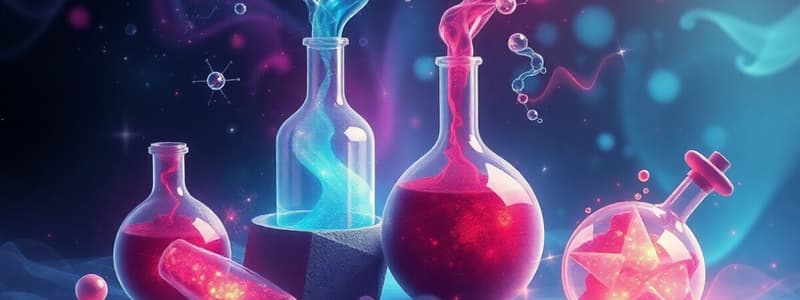Podcast
Questions and Answers
Which area of chemistry focuses on the relationship between macroscopic properties and molecular behavior?
Which area of chemistry focuses on the relationship between macroscopic properties and molecular behavior?
- Analytical Chemistry
- Physical Chemistry (correct)
- Organic Chemistry
- Inorganic Chemistry
What concept in thermodynamics studies energy changes in chemical and physical processes?
What concept in thermodynamics studies energy changes in chemical and physical processes?
- Kinetics
- Entropy (correct)
- Enthalpy (correct)
- Gibbs Free Energy (correct)
Which branch of chemistry primarily investigates the synthesis and properties of compounds that do not contain significant amounts of carbon?
Which branch of chemistry primarily investigates the synthesis and properties of compounds that do not contain significant amounts of carbon?
- Inorganic Chemistry (correct)
- Biochemical Chemistry
- Physical Chemistry
- Organic Chemistry
Which of the following is NOT commonly studied in the field of organic chemistry?
Which of the following is NOT commonly studied in the field of organic chemistry?
What aspect of physical chemistry studies the rates and factors affecting chemical reactions?
What aspect of physical chemistry studies the rates and factors affecting chemical reactions?
Which type of compounds does inorganic chemistry primarily focus on?
Which type of compounds does inorganic chemistry primarily focus on?
Which of the following statements about organic compounds is incorrect?
Which of the following statements about organic compounds is incorrect?
What method is used in spectroscopy to study molecular and atomic structure?
What method is used in spectroscopy to study molecular and atomic structure?
Flashcards
Chemistry
Chemistry
The scientific study of matter, its properties, composition, and behaviour
Physical Chemistry
Physical Chemistry
The theoretical foundation of chemistry, exploring physical properties of chemicals
Thermodynamics
Thermodynamics
Study of energy changes in chemical & physical processes (enthapy, entropy, Gibbs)
Inorganic Chemistry
Inorganic Chemistry
Signup and view all the flashcards
Organic Chemistry
Organic Chemistry
Signup and view all the flashcards
Spectroscopy
Spectroscopy
Signup and view all the flashcards
Functional group
Functional group
Signup and view all the flashcards
Chemical Reaction
Chemical Reaction
Signup and view all the flashcards
Study Notes
Chemistry Overview
- Chemistry is the scientific study of matter, its properties, composition, and behaviour.
- It encompasses various sub-disciplines, including physical, inorganic, organic, and analytical chemistry.
- Chemistry explores the structure of atoms, molecules, and the interactions between them.
- It uses the scientific method to develop theories and laws to explain observations.
- Foundational to many fields, like biology, medicine, materials science, and engineering.
Physical Chemistry
- Focuses on the theoretical foundation of chemistry, exploring the physical properties of chemicals.
- Concerned with the relationship between macroscopic properties and molecular behaviour.
- Covers areas such as thermodynamics, kinetics, electrochemistry, and spectroscopy.
- Key concepts include:
- Thermodynamics: Studies energy changes in chemical and physical processes, including enthalpy, entropy, and Gibbs free energy.
- Kinetics: Investigates the rates of chemical reactions and the factors affecting those rates.
- Spectroscopy: Uses electromagnetic radiation to study molecular and atomic structure and properties.
- Electrochemistry: Explores chemical reactions involving electron transfer and the properties of electrochemical cells.
- Uses mathematical models and equations to predict and explain phenomena.
Inorganic Chemistry
- Deals with the synthesis, structure, and properties of inorganic compounds.
- These include compounds not containing significant amounts of carbon.
- Focuses largely on metals and their compounds, and on non-metals.
- Studies the arrangement of electrons in atoms and molecules.
- Investigates the periodic table's trends and patterns of chemical behaviours.
- Includes the study of coordination compounds, transition metals, and main group elements.
- Includes studies of inorganic materials like minerals and ceramics.
Organic Chemistry
- Examines the structure, properties, composition, reactions and preparation of organic compounds.
- Organic compounds are essentially carbon-based compounds and their myriad combinations.
- Focuses on carbon's unique ability to form long chains, rings, and complex structures.
- Includes the study of functional groups, isomers, and reaction mechanisms.
- Explores classes of organic compounds such as alkanes, alkenes, alcohols, etc.
- Has very broad applications in various fields, including pharmaceuticals, polymers, and materials science.
- Organic chemistry is often divided into various sub-fields such as:
- Stereochemistry: Explores the spatial arrangements of atoms in molecules.
- Spectroscopy: Uses spectroscopic techniques to identify and characterize organic molecules.
- Synthetic Organic Chemistry: Focuses on the creation and design of organic molecules.
- Natural Product Chemistry: Studies biologically active molecules found in nature.
Studying That Suits You
Use AI to generate personalized quizzes and flashcards to suit your learning preferences.
Description
This quiz covers the fundamental concepts of chemistry, including its various sub-disciplines like physical, inorganic, organic, and analytical chemistry. It delves into the principles of physical chemistry, focusing on thermodynamics, kinetics, and the interactions of molecules. Test your knowledge on the foundational theories and laws that explain chemical behavior.




